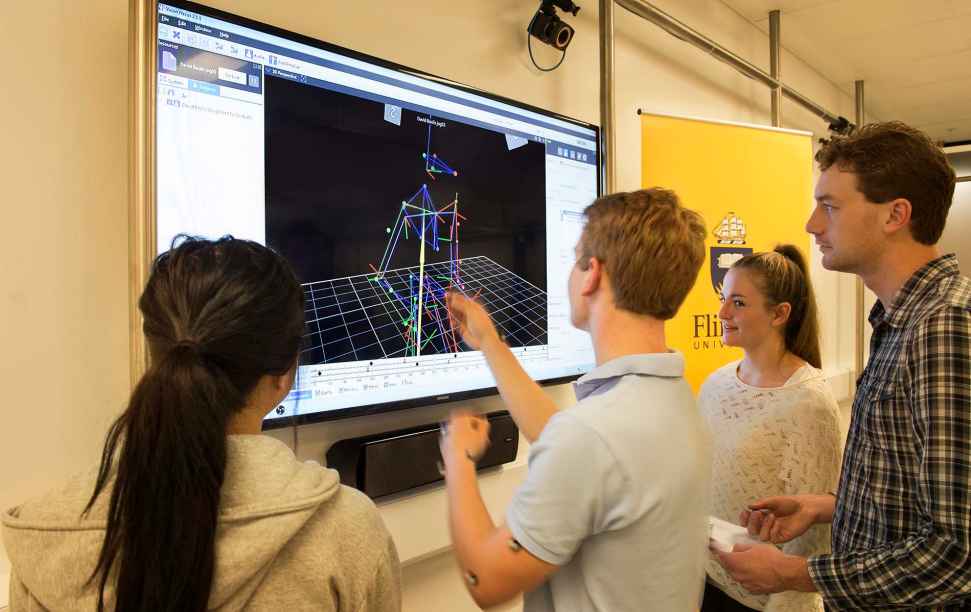Master a hi-tech career
Study Computer Science, Data Science or Information Technology in Australia
Why study postgraduate computer science, data science or information technology at Flinders?
Flinders is No. 1 in AUSTRALIA in Computing & Information Systems for overall quality of educational experience.*
With the emergence of high-tech fields including artificial intelligence, machine learning and data analysis, the demand for skilled professions in these rapidly-evolving industries continues to increase.
Designed in close collaboration with industry advisors, Flinders’ postgraduate Computer Science, Data Science or Information Technology degrees will prepare you for the careers of tomorrow.
*The Good Universities Guide 2020 (postgraduate)



IT AND Computer
Science Careers
Are IN Demand
IT AND COMPUTER SCIENCE ROLES COMPRISE MORE THAN 50% OF THE TOP 20 JOB ROLES IN INCREASING DEMAND ACROSS INDUSTRIES*
DATA ANALYSTS AND SCIENTISTS
AI AND MACHINE LEARNING SPECIALISTS
BIG DATA SPECIALISTS
PROCESS AUTOMATION SPECIALISTS
DIGITAL TRANSFORMATION SPECIALISTS
INFORMATION SECURITY ANALYSTS
SOFTWARE AND APPLICATION DEVELOPERS
INTERNET OF THINGS SPECIALISTS
DATABASE AND NETWORK PROFESSIONALS
ROBOTICS ENGINEERS
FINTECH ENGINEERS
*World Economic Forum Future Jobs Survey 2020.
$120 million world-class facility
Study in our world-class $120m teaching and research facility located in the Tonsley Innovation District, just minutes away from our main campus. It is our hub of innovation and entrepreneurship and features state-of-the-art equipment, laboratories and study spaces.
Our research strengths have seen us partnering with major organisations and developing innovations such as Line Zero Factory of the Future at Tonsley, bringing together education, industry and government to facilitate the implementation of Industry 4.0. Line Zero will be the first industrial-scale Factory of the Future facility in Australia, demonstrating the potential and capabilities of advanced robotics and automation.


Industry-based partnerships
Flinders is closely integrated with the many of the advanced technology companies located in the Tonsley Innovation District such as SAGE, Siemens, SIMEC ZEN Energy, Tesla, Micro-X and Rockwell Automation.
Placement opportunities with organisations such as SAGE and Micro-X give Flinders students hands-on, career-ready experience.
As an authorised Cisco Academy, Flinders partnership with Cisco allows you to undertake courses that contribute towards Cisco certification as a Cisco Certified Entry Networking Technician (CCENT) or Cisco Certified Networking Associate (CCNA).
Our leading, global industry partners are integrated into your studies through:
- Guest lectures
- Student placements and live industry projects
- Research consultancy
- Career fairs
Flinders’ postgraduate Computer Science, Data Science and Information Technology degrees have been designed to be accredited by Australian Computer Society (ACS). ACS accreditation is recognised internationally for entry to professional practice by seven other accrediting bodies through the Seoul Accord.

As an authorised Cisco Academy, Flinders’ partnership with Cisco allows you to undertake courses that contribute towards Cisco certification as a Cisco Certified Entry Networking Technician (CCENT) or Cisco Certified Networking Associate (CCNA).

Our degrees are accredited by the Australian Computer Society at the professional level. Courses accredited at this level by the Australian Computer Society are recognised internationally under the Seoul Accord.
Internationally recognised degrees
Learn from industry experts. Your studies will be mentored by leading academics who are active in their respective fields and have the practical skills and industry networks to ensure that you graduate more than ready for the next step in your career path.
Meet some of our team members

"I firmly believe the fundamental outcome of teaching should be to develop independent learners that question, criticise and test everything they see and encounter in the world. I always strive to maintain an enthusiasm for the individual student and their unique learning goals and future aspirations.”
Anna Shillabeer is the Teaching Program Director (Computing and Mathematical Sciences) at Flinders. She has more than 20 years’ experience in higher education, corporate capacity building and health information and has worked in universities in Australia, the US and Vietnam.
Anna’s research focuses on personalised healthcare and education technology and performance improvement. She is considered a world expert in Vietnamese medical education.
.jpg/_jcr_content/renditions/970.jpg)
"Teaching computer science and computer programming is more about teaching problem solving than learning a programming language. I take the approach that by teaching the steps to solve the problem, rather than focussing on the language, the language becomes almost irrelevant."
Carl Mooney is a lecturer in the College of Science and Engineering at Flinders. His teaching areas include computer programming, database systems and software engineering.
Carl is interested in the community applications of computer programming and has assisted in the production of e-learning modules to aid in the transition to retirement for various groups around the country.

"The Flinders approach to Artificial Intelligence (AI) is very interdisciplinary, emphasizing language and learning, as well as intelligent agent, robots and vehicles. Much of the emphasis is now on understanding the people side of the equations, how we learn, how we use language, how distinguish faces and objects. Current technology is brittle because of a lack of understanding of the way people work - so the way AI’s currently work is quite different, and can give unexpected result. We aim to bridge that gap and usher in an age of really intelligent AI. We need not just people interested in computers, but people interested in people, in language, in psychology, in neuroscience! "
David Powers has worked at universities in Europe and China as well as Australia. His research has a focus on language, learning and logic, and he’s made both theoretical advances and very practical contributions to AI - including be responsible for multiple spinoff companies using language and learning technology to help people deal with health issues, to providing teaching, training and advice, and to enable big name companies to do their job better.

"Knowledge has no boundaries and I see the various sciences as distinct manifestations of the same fundamental truth. That's the main drive of my career, teaching and research, where computing is used as a tool, and artificial intelligence as a means, to understand the very nature of knowledge itself."
Paulo Santos is a Senior Lecturer conducting world-class research with over 15 years of experience in research and teaching, acting on computer science and robotics with emphasis on the following subjects: spatial reasoning, knowledge representation, machine learning, cognitive robotics, computer vision and logic programming.

“I believe games and play are part of our culture and how our current generation share their stories. Games provide a unique, powerful and engaging way to consider, understand and experience knowledge.”
Brett Wilkinson is a lecturer in computer game development and serious gaming at Flinders. His teaching has an emphasis on discovery-based learning, utilising games, and game mechanics to encourage engagement and motivation.
Brett has designed a range of games and virtual experiences for the classroom and learning. He worked with students on award-winning serious games for learning mathematics, new languages, how to program, Australian history and mental health awareness.

“I believe that teaching is not only the art of engaging learners in problem-solving and critical disposition but also a continuous exercise in self-learning, discovery, and reflection. Computer science and I.T. students require life-long learning skills to prepare themselves for unfamiliar challenges in the future. I believe that teaching and learning should be applied, producing highly employable graduates ready to work in the industry. These distinctions essentially require practice-oriented teaching, where student see, learn, think, and implement.”
Saeed Rehman is a Senior Lecturer in Cybersecurity and Networking, prior to joining Flinders, Dr Saeed has worked as a Senior Lecturer at different Universities in New Zealand.
Saeed’s research work is focused on the communication security of wireless communication systems.
Specifically looking into the physical layer impairments, like channel and transmitter frontend, to secure wireless communication systems, such as WiFi, IoT, cellular network, or satellite communication systems.
Over the last years, Saeed has investigated the use of radiometric fingerprinting (R.F.) of wireless devices for identification and security. He has introduced a new R.F. technique and demonstrated its feasibility under realistic conditions, and robustness to impersonation attacks.

"For me, the Flinders Master of Information of Technology was the most attractive as the course subjects were technical. I researched other universities in South Australia, but most of them were focused on management. No other university was offering this technical focus and the reviews were really good – that's why I chose to study at Flinders. "
![]()
Sturt Rd, Bedford Park
South Australia 5042
South Australia | Northern Territory
Global | Online


